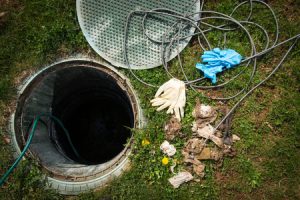
Your septic system plays a crucial role in managing wastewater from your home, ensuring a safe and healthy environment. With proper care and maintenance, you can significantly extend the lifespan of your septic system, avoiding costly repairs and replacements down the line.
Be Mindful of Water Usage
Conserving water is not only beneficial for the environment but also for the health of your septic system. Excessive water usage can overwhelm the system and lead to premature failure. Implement the following water-saving practices:
- Fix leaks promptly: Address any leaks in your plumbing fixtures or pipes immediately to prevent unnecessary water wastage.
- Install low-flow fixtures: Replace old faucets, showerheads, and toilets with low-flow alternatives to reduce water consumption.
- Space out water usage: Avoid overloading your septic system by spacing out activities that require significant water usage, such as laundry or dishwashing.
Practice Proper Waste Disposal
Your septic system is designed to handle specific types of waste, and certain items can cause clogs, damage, or disrupt the system’s balance. Follow these guidelines for proper waste disposal:
- Use septic-safe products: opt for septic-safe toilet paper, detergents, and cleaning agents to minimize the impact on your septic system.
- Avoid flushing non-biodegradable items: Never flush items like wipes, diapers, feminine hygiene products, cigarette butts, or medications down the toilet. These can clog the system or introduce harmful chemicals.
- Be cautious with kitchen waste: Avoid pouring cooking oils, grease, or coffee grounds down the drain as they can accumulate and cause blockages in your plumbing and septic system.
Schedule Regular Maintenance
Regular maintenance is essential for keeping your septic system in optimal condition. Consider the following maintenance tasks:
- Pump your tank regularly: Schedule professional septic tank pumping every three to five years, depending on the size of your household and usage. Regular pumping prevents solids from building up and clogging the drain field.
- Inspect and maintain components: Have a professional inspect your septic system regularly. They can check for signs of wear and tear, leaks, or any other issues that may compromise the system’s functionality.
- Protect the drain field: Avoid parking vehicles or placing heavy structures over the drain field area, as this can compress the soil and impede the system’s ability to properly filter and treat wastewater.
Practice Water Drainage Management
Proper water drainage management is vital for the health of your septic system. Follow these tips to ensure effective drainage:
- Divert water sources: Direct water from downspouts, sump pumps, and other sources away from the drain field to prevent excess water accumulation, which can lead to system failure.
- Avoid landscaping near the septic system: Plant trees, shrubs, and large plants at a safe distance from the septic system to prevent roots from infiltrating pipes and causing damage.
Educate Your Household
Ensuring that everyone in your household understands the do’s and don’ts of septic system care can go a long way in extending its lifespan. Educate your family members on the following:
- Proper waste disposal: Emphasize the importance of only flushing biodegradable items and using septic-safe products.
- Water conservation: Encourage everyone to be mindful of water usage and adopt water-saving habits.
- Reporting issues: Instruct your family members to report any signs of septic system problems, such as slow drains, foul odors, or wet areas in the yard, so that prompt action can be taken.
If you’re concerned about your septic system, reach out to us today. Contact Freedom Septic Service at (410) 795-2947 today or visit us online for more information about our septic system services!

Leave a Reply
You must be logged in to post a comment.